The end of the year is fast approaching and some analysts and investors have been offering their views on where the stock market might be heading.
As one would expect, opinion is divided. Some think we’re entering a new computing era, where productivity gains driven by artificial intelligence (AI) will be like nothing we’ve ever seen.
On the other hand, some analysts now see a recession as inevitable due to the ‘higher-for-longer’ interest rate environment. Stocks could plunge in response.
Which view is right? Here are my thoughts.
Contrasting takes
JPMorgan’s chief market strategist Marko Kolanovic has turned bearish and is preparing for a potential 20% pullback in the S&P 500.
He believes consumers are becoming dangerously cash-strapped due to high interest rates and inflation. And he fears that the AI rally could be about to unravel, pointing to the falling S&P 500 as a potentially bad omen.
He told CNBC: ″[We’re] not necessarily calling for an immediate sharp pullback. Could there be another five, six, seven percent upside in equities? Of course… But there’s a downside. It could be 20% downside.”
In contrast, Altimeter Capital CEO Brad Gerstner thinks AI is going to be bigger than the internet and the mobile phone. And he believes AI’s rise will create an investing “super-cycle” similar to the internet.
Last month, Gerstner said: “I’m very optimistic over the course of the next two or three years. Why? Because we’re not going to continue to hike rates, and we’re at the beginning of one of the biggest tech booms in the history of technology“.
Loss aversion
To me, bearish forecasts often sound convincing, especially when things like an inverted yield curve are highlighted. And humans (understandably) are hard-wired to prick their ears up at bad news.
Indeed, science tells us that the pain of losing is psychologically about twice as powerful as the pleasure of gaining. So, the pain of losing £10,000 in the stock market is often far greater than the joy of a £10,000 return.
In behavioral economics, this is called ‘loss aversion’. And this overwhelming fear of loss can cause investors to behave irrationally and make poor decisions.
For example, studies have shown that late October 1987 (after the Black Monday market crash) proved to be one of the best buying opportunities of the last 50 years. But most fearful investors missed out or, worse still, panicked and sold their shares at a huge loss.
During stock market crashes, Warren Buffett advises investors to actively go against this natural aversion to loss. He urges us to “buy when others are fearful“.
Rise or fall?
At the risk of appearing to be fence-sitting, I think both views could end up being right. The S&P 500 could crash 20% next year, then recover all those losses and reach new heights as companies harness this potentially revolutionary new technology.
Now, I do think some AI stocks look overhyped and overpriced today. But like the internet, we could be both overestimating AI’s potential in the short term and underestimating its impact in the long run.
So, I’m avoiding AI stocks for now and instead buying high-yield UK shares. But if the S&P 500 crashes 20%, I’ll be fishing across the pond again.








